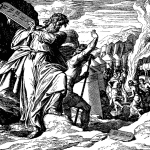
A Reformed Baptist (Calvinist) argued that if Christ in fact died for all men, rather than the elect only (as Calvinists hold), this would result in His interceding in heaven as high priest for those He knows (in His omniscience and perfect foreknowledge) will reject Him and go to hell.
It would then follow that His intercession failed, or (if there is any difference) was unanswered — an unthinkable state of affairs for God.
The reply to this is, I think, simple: yes, Christ’s intercession failed, in the cases of those who went to hell, because human free will trumps even God’s will (by God’s own design). Hence, Calvinism denies free will as well (in effect, futilely to try to overcome this difficulty).
Once that goes, then whatever Jesus prays for in terms of men would inevitably happen, and that is what creates the intended supposed “dilemma” for the person who holds to universal atonement (as virtually all Christians besides Calvinists do).
God allows things to happen that go against His perfect will. The devil’s (and demons’) own fall from grace is an example. I imagine that Jesus, who is eternal, prayed to the Father for Lucifer at one time, since he was God’s greatest creation. The fall of man is another (most Calvinists no longer being Supralapsarian — which means believing that God preordained the Fall of man — though I have argued that Calvin himself was).
Jesus chose Judas to be His disciple. He prayed for him, no doubt, as He did for all the other disciples, but Judas’s free will couldn’t be overcome (lest it not be free will at all).
Here are two examples from Scripture of Jesus’ willing one thing (and in one case, praying for it), and men willing another thing, and (guess what?) the rebellious will prevails:
Matthew 23:37 O Jerusalem, Jerusalem, killing the prophets and stoning those who are sent to you! How often would I have gathered your children together as a hen gathers her brood under her wings, and you would not! (cf. Luke 13:34)
Jesus prayed specifically that His followers “may be one, even as we [He and the Father] are one” (John 17:11) and “that they may all be one; even as thou, Father, art in me, and I in thee” (John 17:21), and again, “one even as we are one, I in them and thou in me, that they may become perfectly one” (John 17:22-23).
Clearly, Christians fall far short (abominably short) of what Jesus intended for this prayer (again, out of our free will to sin and not follow His desires and commands), so it is equally plainly a failed prayer.
Jesus prayed that His disciples would be one. We’re not. We will be one in heaven, but not on earth. His overall providence doesn’t fail, because it incorporates within itself our free-will responses, including rejections of His perfect will. But individual prayers fail if their aim is not met: even for Jesus.
Likewise, God can’t do some things, even though He is omnipotent. They have to be logically possible. For example, He can’t make a square circle or make two plus two equal five. He can’t obliterate Himself out of existence or make Himself noneternal.
This is what lies behind the old atheist challenge: “Can God make a rock so heavy that He couldn’t lift it?” He cannot do so; not because He is not omnipotent (able to do all that is possible to do), but because no weight is too heavy for Him to “lift”: therefore there is no such rock that He can create. It’s logical impossibility; not a disproof of His omnipotence. But the atheist is counting on us not to recognize the necessary distinctions (or, more likely, he does not grasp them himself).
Jesus prayed, “My Father, if it be possible, let this cup pass from me; nevertheless, not as I will, but as thou wilt” (Matt. 26:39). But it wasn’t possible, because some things aren’t possible even for God. In this instance it wasn’t possible for Jesus to avoid the Passion.
2 Peter 3:9 The Lord is not slow about his promise as some count slowness, but is forbearing toward you, not wishing that any should perish, but that all should reach repentance.
But we know that not all reach repentance. Damned folks go to hell. We know that for sure because Scripture mentions it in several places (see, e.g., Matt. 5:22; 10:28; Matt. 23:33; 25:41).
Therefore, God’s desire, which for Him is the same as a prayer because He knows all at once, is not fulfilled in its goal (the salvation of all). It can’t be, given human free will, which He allowed to be present. God gives all men sufficient grace to be saved, but that can be rejected and is, in fact, by the reprobate.
Some try to argue that Jesus’ prayer for Christian unity in John 17 is answered in heaven, but the context (which has nothing to do with perfection in heaven, but rather, life in this world, with all its problems) utterly rules that out as an explanation:
John 17:11 And now I am no more in the world, but they are in the world, and I am coming to thee. Holy Father, keep them in thy name, which thou hast given me, that they may be one, even as we are one.
John 17:15 I do not pray that thou shouldst take them out of the world, but that thou shouldst keep them from the evil one.
John 17:17 Sanctify them in the truth; thy word is truth.
No more sanctification takes place in heaven.
John 17:18 As thou didst send me into the world, so I have sent them into the world.
In each case, the context is in the world.
John 17:2 that they may all be one; even as thou, Father, art in me, and I in thee, that they also may be in us, so that the world may believe that thou hast sent me.
John 17:23 I in them and thou in me, that they may become perfectly one, so that the world may know that thou hast sent me and hast loved them even as thou hast loved me.
The previous two passages can’t possibly apply to the afterlife, because they have to do with witness. If they are one in the world, the world will believe in Jesus as a result of observing them.
We thus conclude from the previous passages:
1. Can God will one thing without its coming to pass? Matthew 23:37 shows that this can indeed happen. So does 2 Peter 3:9, where God desires that none perish, yet many do and go to hell.
2. Can something that Jesus prays for not happen? John 17 shows this, and the Calvinist’s exegesis is utterly implausible and takes no account of the entire repeated context, which has to do with the world, not the final state.
There are some things that even God can’t do. He can’t force a person to believe with his free will opposed, because the two notions are incompatible. But He can give everyone enough grace to be saved, and they have it in order to cooperate with their free will.
God doesn’t predestine people to hell, though (only to heaven). That is Calvinist heresy. And so the people in hell run counter to God’s desire (in Scripture) that none perish.
It was virtually impossible for Jesus’ prayer in John 17 to have been realized, given human sin. By allowing human free will, God allows into the universe sins that are not in accord with His perfect will. And He can’t make a man with free will unfree by forcing him to be good and righteous and nonrebellious.
***
(originally from 2015)
Photo credit: Christ on the Mount of Olives, by Josef August Untersberger, aka Giovanni (1864-1933) [public domain / Wikimedia Commons]
***













